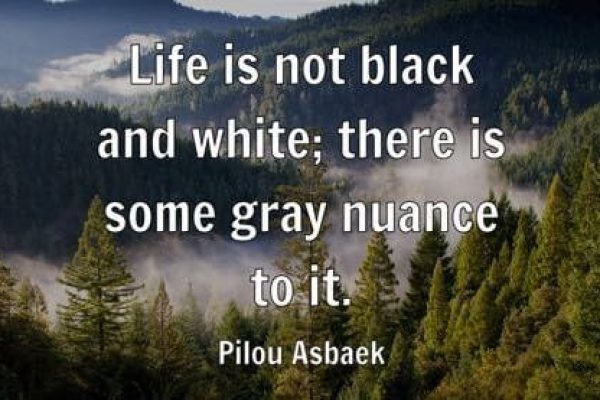This weekend, my precious little one entered the world and joined our family. I am filled with immense joy as I embark on this journey of fatherhood. Today, I would like to address a prevalent issue in our society—the absence of nuance—and discuss ways in which we can work towards its improvement. However, before delving into that, let’s begin with the weekly inventory check.
Weekly Inventory Check:
The experience of becoming a father has brought to my attention the need to reassess and reprioritize certain aspects of my life. Taking care of a little one is undeniably challenging, and it demands careful consideration when it comes to adjusting priorities. Therefore, I believe it is an opportune moment for all of us to reflect on our yearly and six-month goals, evaluating if we are still on the right path. Perhaps, this is also an ideal time for a reset, if necessary.
Nuance
Nuance entails embracing perspectives beyond binary distinctions. It manifests in various forms and our human nature, constrained by perpetual time constraints, often compels us to expedite matters. An illustrative example of this phenomenon is the development of the COVID-19 vaccine, which was accelerated to address the pressing need. However, this expeditious process generated opposition among certain individuals. Nevertheless, postponing vaccine development would have amplified the risk of further virus transmission. Additionally, a prevailing tendency among people is to harbor an inclination towards action while eschewing comprehensive information. When provided with copious details, individuals may deem it unworthy of their time and consequently overlook the available information.
People often avoid nuanced considerations, leading to increased challenges in their lives. Reliance on navigation apps like Google Maps limits independent decision-making, as users struggle to interpret ambiguous directions. While some individuals prioritize nuance when evaluating products, others disregard its value. In democratic societies, it is our responsibility to form well-informed opinions, but many prioritize personal matters and adopt simplistic viewpoints. Communication with peers and decision-makers is essential, as is instilling environmental responsibility in future generations. Despite recognizing global threats, we often lack motivation to take necessary action. A significant portion of the population lacks education and awareness regarding their role in politics and society. Educated individuals, while concerned for public welfare, contribute minimally to politics. Populist movements have gained traction in certain countries, with younger generations exhibiting apathy towards environmental issues. Conversely, older individuals were influenced by misinformation during the Brexit vote. Alienation and economic hardships can discourage engagement in cultural and environmental initiatives.
The question of guiding young individuals towards nuanced thinking arises due to the observation that despite the abundance of information available today, their opinions often remain un nuanced. In countries with populist tendencies like the United States, freedom of speech is not adequately upheld, despite the population’s access to education. It is imperative that human rights be granted to deserving individuals, empowering them to make nuanced decisions. Developed nations boast educated populations with the capacity to discern erroneous choices, but the granting of such decision-making rights should not be exclusive to them. The education system fails to incorporate the teaching of nuance, necessitating the recognition and elevation of individuals possessing critical thinking skills, thereby granting them the rights of citizenship and enabling them to express nuanced perspectives.
Suggestions for cultivating a nuanced society include encouraging conversations that encompass both sides of a topic, avoiding rigid adherence to a single perspective, and making debates engaging to promote active participation and the exchange of information. One-on-one discussions stemming from debates can foster nuanced conversations. It is important for individuals not to rely solely on news journalists for information, but rather to conduct their own research and seek out multiple perspectives. While achieving a completely nuanced society may be challenging, engaging in open dialogue and considering the viewpoints of others can help bridge gaps. Taking into account the audience’s perspective and fulfilling one’s own responsibilities are crucial in fostering a nuanced society. Holding institutions accountable for change, rather than placing the burden solely on individuals, is necessary as people may have different approaches to a common cause. Providing individuals with information and promoting accountability can empower them to make nuanced decisions and advocate for societal changes. For instance, in the case of Pakistan, where PEMRA banned speeches by Imran Khan and limited discussion about him on news channels, the responsible institution should ensure the dissemination of accurate information to enable the formation of nuanced opinions. It is worth noting that some movements, such as the LGBTQ community, may lose sight of their initial objectives as they progress because awareness serves as an important first step, it alone is insufficient to bring about lasting change. Establishing robust institutions with the authority to safeguard and protect individuals is paramount. It is important to strike a balance regarding the amount of information provided, as an excess of information does not necessarily equate to wealth and good health, as exemplified by the insightful statement made by my coach. The quality and accuracy of information hold greater significance than its sheer volume, as misleading or misguided information can have adverse effects.
Want More?
This article presents a critical viewpoint on nuance, arguing that it can have negative implications for society. It suggests that people’s avoidance of nuanced considerations can actually be beneficial, as it simplifies their lives
This article delves into the necessity of nuance in today’s political landscape and ultimately posits that embracing less nuance can lead to better decision-making. It explores the idea that excessive nuance may hinder effective governance and policymaking.
This article advocates for the importance of nuance in our lives and society, emphasizing the need for critical thinking, independent thought, open-mindedness, and the exploration of multiple credible sources.
Read of the Week
Book: Too Much Information By Cass R. Sunstein · 2020 Understanding What You Don’t Want to Know. This book explores information we receive and what we do with it. Also, discusses the question, when should the government require people to disclose information? A lot of the debate around information disclosure focuses on having the “right to know,” but Cass Sunstein argues that it is more useful to think of information and its effects on peoples’ well-being.
Thoughts to Leave You with
The importance of nuance in fostering an informed society cannot be overstated. A well-informed society has the ability to make better decisions, and this is crucial in our quest for progress. However, I do acknowledge the challenges that arise when we expect everyone to be on the same page, to conduct thorough research, and to possess informed opinions. It requires effort and dedication to engage in meaningful conversations rather than simply voicing impulsive thoughts.
It is essential for us to recognize that this expectation can be quite demanding for individuals. It is natural for some people to prefer an easier path, to keep discussions superficial, and to avoid the mental exertion required for forming informed opinions. While this may be their choice, it is important for them to be aware of the reasons and trade-offs they are making.
Ultimately, what matters is that we have a comprehensive understanding of the topics we discuss, regardless of whether nuance is present in every aspect of our lives. As long as we are knowledgeable about the subject matter and conscious of the choices we make, it is not necessary for nuance to permeate every aspect of our existence.


